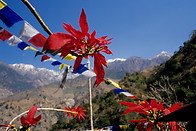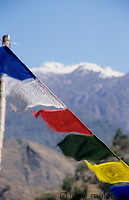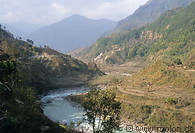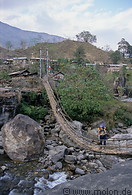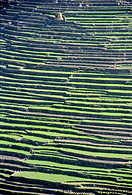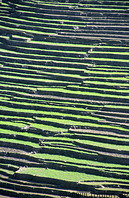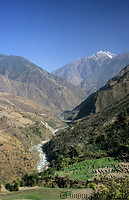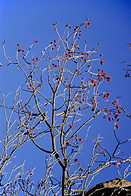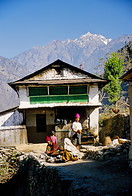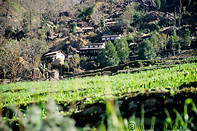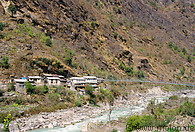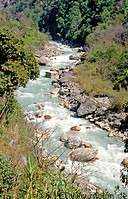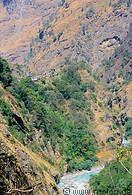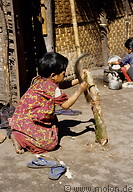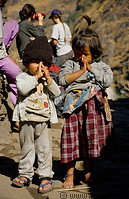Usually trekkers arrive in Besisahar (820 m) by bus, there are different ones, from the “luxurious” tourist bus to the simple and overcrowded public bus, but they all arrive in Besisahar in the early afternoon, just in time to start walking for the first half day or find a lodge to stay overnight. The trail starts easily, always following the Marsyandi river. The first highlight is the long suspension bridge you cross in Khudi. From here you can also have a glimpse of the gorgeous Manaslu range.
In Bhulebhule (840 m) you enter the ACAP region (Annapurna Conservation Area Project). You pay a low access fee and get informed that bargaining is not ok in the ACAP area and what else you should do or not do. It’s a fine job the administration is doing, the life standard has got quite higher then in other regions. The trail is already very interesting, the Marsyandi is very beautiful and you can enjoy it as it’s not a hard walking. There are lots of villages quite close the one to the other, and in addition there are some tea-houses and lodges on the way between.
You pass Ngadi (940 m) very easily and approach the first steep ascent: the dangerous hill of Bahundanda (1310 m): a sweaty slog up to the ridge top-village. For many people this is an ideal first day goal. Bahundanda is also very famous for its spectacular rice terraces. On the other side of the ridge the way goes down again the same altitude you had gained before, very frustrating…
Always following the Marsyandi you walk in a fantastic landscape, crossing little waterfalls and villages. Meeting locals is very interesting, everyone greets you with a loud namaste! The only danger is represented by the long mule caravans, on the narrow trail you should always stay on the mountain side of it!
The way is easy until Syanje (1100 m) but soon afterwards you have to climb up to Jagat (1300 m), which I remember as very hard work in the midday sun, and after that you reach Chamje (1430 m), which is also a good place to rest or sleep. There are also some hot springs to visit, not far away from the trail. On this first part of trek you walk trough Gurung villages with mud and thatch houses and sub-tropical vegetation.
In Bhulebhule (840 m) you enter the ACAP region (Annapurna Conservation Area Project). You pay a low access fee and get informed that bargaining is not ok in the ACAP area and what else you should do or not do. It’s a fine job the administration is doing, the life standard has got quite higher then in other regions. The trail is already very interesting, the Marsyandi is very beautiful and you can enjoy it as it’s not a hard walking. There are lots of villages quite close the one to the other, and in addition there are some tea-houses and lodges on the way between.
You pass Ngadi (940 m) very easily and approach the first steep ascent: the dangerous hill of Bahundanda (1310 m): a sweaty slog up to the ridge top-village. For many people this is an ideal first day goal. Bahundanda is also very famous for its spectacular rice terraces. On the other side of the ridge the way goes down again the same altitude you had gained before, very frustrating…
Always following the Marsyandi you walk in a fantastic landscape, crossing little waterfalls and villages. Meeting locals is very interesting, everyone greets you with a loud namaste! The only danger is represented by the long mule caravans, on the narrow trail you should always stay on the mountain side of it!
The way is easy until Syanje (1100 m) but soon afterwards you have to climb up to Jagat (1300 m), which I remember as very hard work in the midday sun, and after that you reach Chamje (1430 m), which is also a good place to rest or sleep. There are also some hot springs to visit, not far away from the trail. On this first part of trek you walk trough Gurung villages with mud and thatch houses and sub-tropical vegetation.

